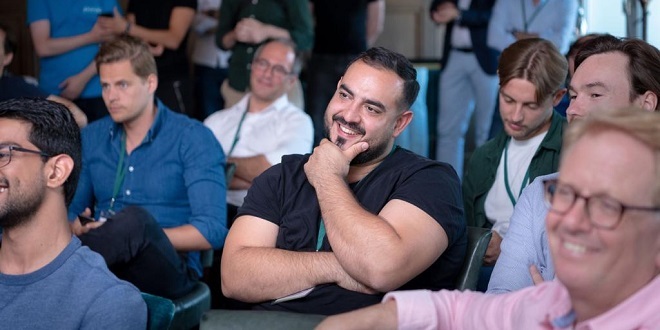Getting an outside opinion on a particular topic can deliver interesting insights as to how an idea can be approached. And according to Bayes Esports, a leading esports data and services provider, drawing on the expertise of lateral professionals from other industries has helped bring a fresh new skillset to a sector on an upwards trajectory.
We spoke to Juana Bischoff, Vice President Sales at Bayes Esports, and Amir Mirzaee (pictured, centre), formerly of Google and now the company’s COO, who both discussed their first foray into the esports sector, the changing perception of the sport and the importance of hiring top talent from different industries.
SBC: What was your perception of esports from outside of the industry?
JB: To be really honest, I wasn’t aware that esports is at such a professional level and I even remember asking once: “How can you earn money with esports?” I am sure a lot of people would ask the same question and you see a lot of surprised faces when coming up with details about prize pools, viewerships and revenues generated with esports.
AM: I’m a vivid long-time game lover and I always used to follow gaming media like IGN, vloggers, etc. so I knew that there was huge momentum in the space. I just hadn’t quite realised that the commercialisation and professionalisation of the industry had progressed so rapidly within a few years.
I wasn’t aware that from a business and industry perspective, esports would be following so closely in the footsteps of traditional sports. Now I understand that it’s the obvious and most natural progression.
SBC: And what was it about the industry that prompted you to make a career change?

JB: It fills me with joy to solve problems of customers they are facing in the industry. In this special regard it was the fact that there was no bridge between tournament organisers/publishers who are supplying data and companies who are demanding data.
Bayes Esports has this high-class infrastructure and connects both sides on BEDEX, our marketplace. That caught my attention.
SBC: And you Amir, what made you pursue a different career?
AM: I’m a strong believer in linking passion to business. I think in today’s shark tank, i.e. in modern performance centered society, we don’t always follow a path that centers around passion but rather around functionality. I’m talking about degrees, future career opportunities, salaries, etc. At best, most people do things that they are somewhat passionate about, and in my case that is general tech business.
Working at companies like Google eventually gave me a solid skill set to work with, great insights into running leading tech businesses and I’m very thankful for those times and the opportunities. But during COVID times, I decided to put it to better use and double down on gaming as my passion. I couldn’t be happier with the decision.
SBC: On a personal level, what can you bring to the esports industry? What are the obvious synergies you can see between Bayes and your previous work?
JB: At Bayes Esports I’m able to combine my passion for international business as well as customer relationships. Providing customers with solutions to build great products and increase revenue – that drives me every day.
AM: With Bayes Esports, we’re invisible to the public eye, but we fulfil a very central role in the esports ecosystem. Our job is to connect esports with its ecosystem through data. Any website, any app, any broadcast analysis, any visualisation or live score tracker, any kind of online betting that you will ever see needs data to fuel its content. We are that underlying infrastructure, delivering information of thousands of games annually to hundreds of clients across the globe in real time.
Obviously, that’s a bit of a technical miracle and brings tons of technical, operational and legal challenges with it. Both our CEO Martin Dachselt and I have scaled data platforms for years, he for Delivery Hero and others, me for Google and others. We’re bringing global scale and efficiency to esports now.
SBC: So, Amir. From your perspective as COO, why do you think that esports companies are looking to recruit from outside of gaming? Is this based on a skills shortage, or do you think it’s part of a wider approach to emulate the professionalism of other sectors?
AM: I think in any industry, eventually you want top talent from top companies that have been in well-developed business environments and ecosystems. By definition, a growing industry is the underdog in this context and an influx of top talent from other industries is just a pretty reliable indicator that there is solid momentum in growth and monetisation potential. And yes, it also means that the organisation and the industry will benefit from knowledge transfer.
On that note, I absolutely love news like former Major League Baseball executive Tony Petitti joining Activision Blizzard as President of Sports & Entertainment. We’re speaking to Activision Blizzard constantly and we can tell that they are picking up speed already in terms of esports and media strategy.
SBC: Esports is often associated with an underlying ‘wild west’ reputation. Why do you think this is? And what would it take to increase the level of acceptance?
JB: Standards! Same as we know this from traditional sports. At the moment leagues and tournament formats are not standardised and that makes it look like the wild west.
AM: The esports ecosystem is shaping up at an incredible speed all across the globe, meaning esports as a sport is building its infrastructure breathtakingly fast. On the sports and athlete side itself, on the organisational side with leagues and tournaments, on the business and on the corporate side, structures and players (both athletes and business) are emerging from the regional level to the global level, all in parallel.
Where growth is fast, structure is usually lacking and everyone handles their business a little differently. That leads to a lack of transparency, to integrity issues, inefficiencies through varying standards etc. We need organisations to unify the sport regionally and internationally.
We need simple things like governments to recognise and approve esports as a sport. It’s almost the year 2021 and I can play darts at the Olympics as a sports, but I can’t have a team of five highly trained and well paid esports professionals be recognised as athletes in most countries.
Anyone that has seen these guys coordinate an attack down to the millisecond and bring consistent performance over months and years on a level playing field can’t deny that this is a sport, and a fun one at that.
SBC: The COVID lockdown – and associated sports shutdown – brought esports to the attention of a wider, and noticeably older audience; is this a long term trend?
AM: I’ll pick up right where I left off at the last question. I take great pride and huge joy in watching events like the recent League of Legends Worlds 2020 finals with my non-gamer friends and have their jaws drop at some of the moves these athletes pull off.
COVID gave esports eyeballs, but it is the sport itself that turned it into viral growth. People got a test of what esports can be and they are liking it. We and our clients are seeing in all KPI that even though traditional sports came back, we’re seeing that engagement has stabilized at a much higher level than it was a year or two ago.
SBC: Juana, what are your thoughts?
JB: Esports experienced a huge push during the first COVID lockdown and provided business saving content to many companies. Even when traditional sports came back we only experienced a slight dip. Esports is here to stay.
SBC: Do you think increasing the age range of players is part of the esports maturity? Or is it just about cleaning up the act whatever the core demographic?
AM: I think governments need to remove artificial roadblock and help professionalise the industry. Everything else will fall into place. Gamers will grow in age, media and broadcast coverage will pick up further, demographics will diversify.
SBC: Data from H2 Gambling Capital predicted that esports would account for 3.2% of global sports betting GGR by 2024; is this a realistic number?
AM: It’s over 5-6% for some of our major clients already. We could see this grow towards 5% by 2024.
JB: For my perspective it is even underestimating the growth. Esports will crack that number easily and we see this growth on our customers already.
SBC: And finally, Amir, what are your key targets for Bayes? What would constitute success in the next 12-18 months?
AM: We’re the industry leader in esports data services already, but we’re hungry and we want to grow aggressively. You’ll see more exclusive data deals along the lines of Riot and ESL, we’ll be expanding our universal data platform BEDEX that is already industry leading, and we’re working on a brand new betting product that will bring it all together.
We want to be what our JV partner Sportradar is for the traditional sports industry, namely an absolute powerhouse and the go to address for anyone in the ecosystem.









